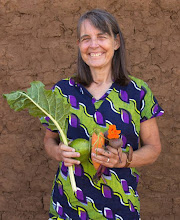& miraculous Moringa. . .
The week has zipped by. The hourglass sand is emptying faster as I enter into the last month of this stint.
The standard fare of beans and rice is excellent, but gets a tiny bit monotonous after two and a half months. For a variety of reasons (including celebrating the passage of health reform in the USA), it was decided that last Monday was the day to have impene (goat) for dinner. After clinic time there was major deliberation as to which one would be served. Brad was all set with the knife, but in the end Elvis did the deed. Dinner was a festive occasion!
A woman hobbled into the clinic barefoot with a large walking stick and a baby on her back two days ago. She reeked with the quintessential smell of infection and necrotic tissue. Brad examined her and discovered that her right breast was bandaged and saturated with a foul, green discharge covering a ragged, deep crater eroding most of the breast. Her 8 month old daughter, Misago (meaning the 11th child), is severely malnourished. They were “fast tracked” through triage and admitted.
Getting her and the baby “settled” took a bit of time; cleaning them, changing the breast dressing, initiating antibiotics, pain medication and vitamins for the mother and getting the baby begun on the standard malnutrition protocol of medications/vitamins and F-75 milk supplement. It seems as though she has breast cancer, requiring the need for surgery and X-rays of her hip for evaluation of possible metastatic bone cancer, neither of which we can provide here at VHW. Right now we will fortify her and get the infection under control and then refer her onwards.
Thanks to the help of Gerard as my translator, I have been able to get a quite in-depth history and hear some of her life story (as well as several other patients). She is 42 and the mother of 11 children. Her husband left her last year. Two children have died and she has left 4 children home alone with a nine year old in charge. She walked about 50 miles in the torrential downpours over two days to get here. Her tenacity, resilience and acceptance of suffering as her status quo is certainly humbling. I feel privileged to be involved in her care, helping her with her right to health care and elevating her dignity.
I have done more home visits this week, dovetailed with Will’s visits to home gardens in Kigutu. I love these times. We are really beginning to integrate the food security program with clinical care and nutrition for the patients and staff with highly nutritious Moringa which is very exciting. Moringa oleifera is a phenomenal “vegetable tree” which is grown on site. It provides huge amounts of beta-carotene, Vitamin C, protein (all amino acids), iron and potassium. The leaves can be cooked like spinach or they can be dried and crushed into a powder and added to cooked foods.
Will has given talks to the mothers in the malnutrition ward about Moringa and we are beginning to give it to the children. This is especially timely due to the cutbacks from UNICEF with the Plumpy Nut supplies. We are now sending patients home with Moringa powder and seedlings too. It is definitely possible that much malnutrition and disease can be prevented through the use of Moringa. Check out www.treesforlife.org to read more about it.
Two staff members, Peter and Mandela, are entering the International Peace Marathon in Kigali in May. It’s terrific to think that VHW, Kigutu and Burundi will be represented by these two remarkable athletes. I will be cheering them on from overseas.
There is a tradition here now at VHW that on the last Thursday on the month we have a soiree for all the staff to celebrate the birthdays which fall within that month. Last night we celebrated Evariste, one of our drivers. It was a fun night for everyone to gather, unwind and dance. This is definitely a special group of people for work and play!
Helen
 Impene preparations
Impene preparations Impene ready for the fire
Impene ready for the fire D and Misajo
D and Misajo Bosco and Will home gardens
Bosco and Will home gardens Will and Bosco giving talk about moringa
Will and Bosco giving talk about moringa Will with moringa powder for severely anemic boy
Will with moringa powder for severely anemic boy Mothers going home with moringa seedlings
Mothers going home with moringa seedlings Sisters
Sisters Mandela and Ferdinand doing laundry
Mandela and Ferdinand doing laundry Kigutu family home visit
Kigutu family home visit Brad and Melino
Brad and Melino Barack and Brad
Barack and Brad Dancing
Dancing Helen with Hussein and Germaine
Helen with Hussein and Germaine
Another amazing sunset over the Congo













































